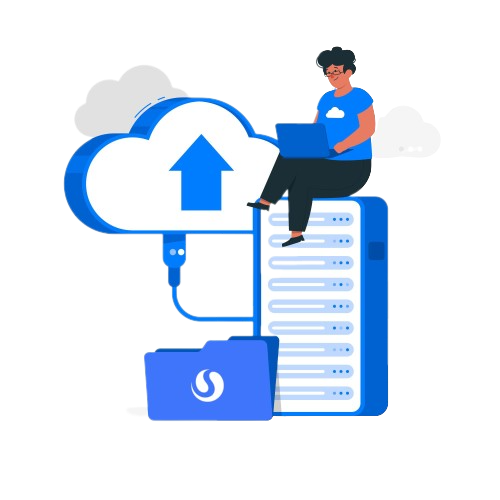Your Monthly Biz Tech Roundup from Seeto
Spring is in the air, the tulips and the daffodils are coming into flower and we’re slowly emerging from our winter cocoon. February was a busy month for business tech news and the Seeto team has selected the brightest blooms to bring you a spring bouquet of the news and views you need to know this month.
In need to know now, we find out about new hardware and upcoming updates and we look at the demise of the metaverse and consider founder salaries and the gender pay gap.
In the Seeto Take we look at the controversy surrounding the current push to return to the office and consider whether hybrid and remote work is good for businesses and how you can ensure hybrid working works securely.
World backup day returns to round out the month on 31st March and we’ll have more about that below.
Finally, don’t forget the clocks spring forward on Sunday 26th; nobody wants to be late for their Monday morning 9 o’clock meeting.
Need To Know
Folder sharing now available for Content Managers in Google Drive Shared Drives
In December, Google teased an upcoming change to shared drive settings for content managers. The change has now been released and content managers have the ability to share folders on newly created shared drives by default. Existing shared drives won’t inherit the change automatically.
Updates, updates, updates everywhere
February was a busy month for operating system updates, with Apple patching serious vulnerabilities in macOS, iOS, iPadOS and Safari. Microsoft also patched 75 vulnerabilities, with some, including an Office vulnerability, being actively exploited. Google released security updates for Android and Adobe updated almost every product in its portfolio.
Read more about the Apple OS updates at Intego
Read more about the Microsoft update at The Register
The metaverse is dead, sorry
Only months after Meta (Facebook’s parent company) announced that the metaverse was getting legs (literally), it has been stopped in its tracks. The days of meeting in a virtual boardroom may never arrive after a spate of announcements from those involved in the development of the metaverse. Meta’s European metaverse hiring plans appear to have faltered; Microsoft has axed its Industrial Metaverse Core team effectively shutting down work on the metaverse; and Chinese tech giant Tencent is struggling to identify promising gaming and non-gaming applications in the metaverse, scaling back its “extended reality” unit, walking away from a planned acquisition and scrapping plans to venture into virtual reality hardware. If the metaverse isn’t already dead, it’s certainly on life support.
Read more at the ft.com (Subscription possibly required)
Read more at Computing World
Read more at Reuters
Although there are more female founders, gender pay disparity is worsening
Sifted benchmarked founder salaries across Europe to discover UK and German founders are paid the most, with women founders paying themselves nearly 25% less than their male counterparts. Worryingly, among a survey of 400 founders, only 22 female founders responded. Back in October, Sifted found that the gender pay gap at UK startups was more than double the national average and worse than in 1992. Research this month, led by Alison Rose of NatWest, celebrated the resilience and entrepreneurialism of women founders, finding that women founded a record number of new companies in the UK last year, meaning female-led companies represented one-fifth of all businesses in the UK. Initiatives are in place to support female founders, but change must speed up.
Sifted: How much do founders earn? The 2023 edition (Registration possibly required)
Sifted: Startups Gender Pay Gap (Registration possibly required)
Pioneers Post: Women entrepreneurs create record number of new UK companies in 2022
New MacBook Air in the works
Apple traditionally keeps its cards close to its chest, when it comes to the development of new hardware. The Mac rumour mill has plenty of pundits to fuel it, with some predictions being very accurate and other hardware seemingly appearing out of nowhere, without so much as a whisper in advance. There is currently talk of a 2023 15” Macbook Air: newer MacBook Airs have moved away from the initial concept of being light enough and thin enough to fit in a padded envelope and that trend seems to be continuing, with a 15” MacBook Air believed to be in the works. Fitting between the compact 13” Macbook Air and Pro models and the larger and somewhat more expensive 16” MacBook Pro, it could become a popular choice for businesses.
Product Showcase

Happy World Backup Day! How will you be celebrating on 31st March? Hopefully by testing your backups. You do have backups, don’t you?
Surveys by the Enterprise Strategy Group have repeatedly found that businesses don’t realise that cloud platforms like Google Workspace and Microsoft 365 need backing up. There’s a belief that Microsoft and Google take care of backups for you, but the reality is that the productivity behemoths make disaster recovery commitments (recovering from tech or natural disasters affecting their infrastructure), but take no responsibility for backing up your data.
It doesn’t have to be that way. Effortless cloud-to-cloud backup is cheaper than you think and can be purchased from Seeto.
For more information about protecting your business’s most important data with cloud-to-cloud backup speak to the Seeto team by sending a message through the contact form.
The Seeto Take
Adjusting to working anywhere

It’s time to return to the office, again, apparently. These stories do the rounds time and again, but are businesses simply shouting into the void? Should businesses be encouraging staff back into the office? Is working from the office attractive to staff?
With a view to understanding whether businesses and their teams are aligned on the issue, Seeto has been crunching the numbers and looking at UK staff sentiment. There will always be roles unsuited to remote and hybrid work, but for those that can, does flexibility make us more productive?
You would think that UK workers were avoiding the office, but research suggests that staff are increasingly spending more time in the office. In the 10 cities tracked by the ReTurn office occupancy project, office occupancy increased through January and February of this year.
In the United States, fears over “quiet quitting” seem to be driving a push to return to the office. For those not familiar with the phrase, quiet quitting emerged as a trend in early 2022. Influencers espoused doing the minimum expected under their job descriptions just well enough. The trend kicked back at America’s “hustle” mentality, which rewards presenteeism and has little to no respect for a work-life balance. Although US productivity data presented a sharp drop during Q1 and Q2 2022, this wasn’t seen in the UK. Data from the Office of National Statistics over the same period shows that productivity (output per hour worked) was at least 1.7% higher than the 2019 average. The ONS attributed some of this growth to a fall in the number of hours worked, suggesting that Brits are working smarter and harder, but not longer.
Staff want remote work. Polling by YouGov in April 2021 showed that most British workers (57%) want to be able to work from home and that the majority prefer hybrid working. ONS findings in April 2022 were similar. Workers reported an increasing desire for remote and (particularly) hybrid working.
There is a disconnect between how staff see their roles and how business leaders view them. Cisco’s 2022 Global Hybrid Work Study found that six in ten full-time employees surveyed believed that both the quality of their work and their productivity increased when working remotely. Some of the concern around remote working is that junior staff are disproportionately disadvantaged, but respondents reported being able to learn, grow and succeed in their roles remotely. Microsoft conducted a similar study, reporting that the majority of employees (87%) believed themselves to be productive at work. Productivity signals across Microsoft 365 backed up this assertion. Managers didn’t agree. Microsoft found that only 12% of leaders have full confidence their team is productive. Businesses are paranoid about productivity. Organisations, though, are often tracking activity as a proxy for productivity, which doesn’t tell the full story. Which is better, an employee making a big impact or one with high activity stats, focused on busy work that doesn’t contribute to your mission?
Office work has to work for teams. Research by Slack found that some UK hybrid workers are spending as much as half their working day on video conferences while in the office. Staff believed the home was the best place to get their heads down and focus on “deep work”, the value-add tasks at the core of their role. Time in the office should best be spent on activities that make the most of in-person connection. Use the office to collaborate, build working relationships and train together.
To make sure that remote and hybrid workers are as productive as possible, workers’ home offices need to be productive. Logitech surveyed 3000 employees and 1000 IT hardware decision-makers in 2022 to find that staff are still making do in their home offices. Many home offices came about out of necessity, perched on kitchen tables and carved out of spaces dedicated to sleep or leisure. Logitech’s survey found 89% of employees struggle with video and 85% with audio in their work-from-home offices. An employer’s health and safety responsibility doesn’t end at the office door. Home working could have far-reaching ergonomic consequences.
Hybrid and remote working, if done right, could be a real differentiator for your business. It could help you attract and retain talent. Just don’t be Google. Sharing assigned desks, no matter whether you can choose your deskmate should never be the solution.
References:
- Latest data reveals improved UK office occupancy levels – Remit Consulting
- Productivity overview, UK: January to March 2022 – Office for National Statistics
- Productivity overview, UK: April to June 2022 – Office for National Statistics
- One in five want to work from home full time after the pandemic – YouGov
- Is hybrid working here to stay? – Office for National Statistics
- Employees are ready for hybrid work, are you? – Cisco
- Hybrid work is just work. Are we doing it wrong? – Microsoft
- Slack – knowledge workers are back in the office, but spend hours there on Zoom calls – Diginomica
- Equipping your employees for hybrid work – logitech
- Google Tells Some Employees to Share Desks After Pushing Return-to-Office Plan – Gizmodo
Recent OS Updates
Last updated 5 August 2024
Windows
Microsoft currently supports Windows 10 and Windows 11.
- Windows 10 version 22H2 (10.0.19045)
- Windows 11 version 22H2 (10.0.22621) and version 23H2 (10.0.22631)
macOS
Apple officially supports the following Mac operating systems:
- macOS Sonoma 14.6
- macOS Ventura 13.6.8
- macOS Monterey 12.7.6
iOS and iPadOS
The supported iPhone and iPad operating systems are:
- iOS 17.6
- iPadOS 17.6
Android
Google supports the following Android operating systems:
- Android 14
- Android 13
- Android 12
Note that your device manufacturer may not support every version that Google produces security fixes for.
Learn how to check and update your Android version here.


